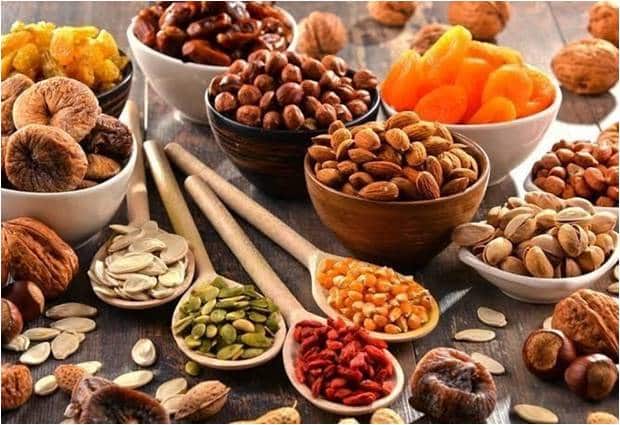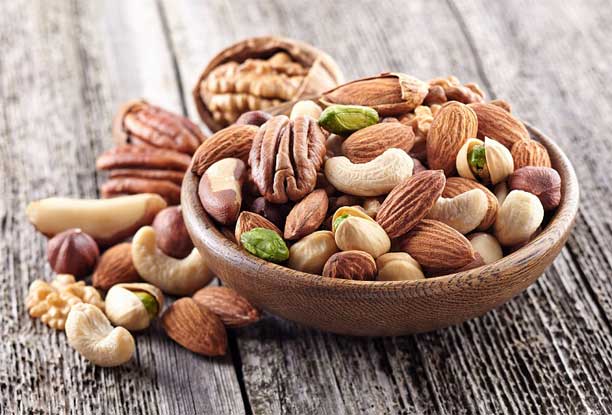Blog
What is the best dry fruit for collagen?

The Role of Dry Fruits in Collagen Synthesis:
People like dried fruits as they are rich in nutrients and be good to your body. They are packed with vitamins, minerals, enzymes, and amino acids that your body requires to make collagen. Eating these nutrient-dense foods can provide the body with some of the raw materials required to repair tissues and build collagen. Let’s go on a trip through the lush fields of nature to find the best dry fruits that are known to help boost collagen:
1. Almonds: Almonds are one of the most beneficial dry nuts for building up collagen as they are rich in vitamin E, which is a potent antioxidant that is also well known for its skin-nourishing properties. Vitamin E is a very important nutrient needed to protect collagen fibers from the oxidative damage caused by free radicals. This enables the skin to be strong and supple. Furthermore, almonds are loaded with copper, which is a trace mineral that is needed for collagen production. While incorporating almonds (either as a stand-alone-snack or as a crunchy add-on to salads and desserts) in your diet, you can slow down the aging process of your skin and increase its collagen production.
2. Walnuts: Walnuts have a weird shape that makes them look like brains. They provide omega-3 fatty acids, enzymes, and vitamins, which are essential for your skin and aid in the production of collagen. Some of the omega-3 fatty acids such as alpha-linolenic acid (ALA) are responsible for maintaining the skin hydration and limiting inflammation. They collaborate with collagen to maintain the flexibility and strength of the skin. Moreover, walnuts are rich in biotin, a B vitamin that forms keratin, which is necessary for hair and nail health. You can consume walnuts as a standalone snack, use them as a topping for meals, or incorporate them in baked food items. They are a part of any healthy diet.
3. Brazil Nuts: Those are nuts from the Amazon jungle, but as they have a lot of selenium, which is a trace mineral with strong antioxidant properties. Selenium aids the production of collagen by preventing the damage of collagen fibers through oxygen and enhancing the activity of enzymes involved in collagen synthesis. Selenium also makes the immune system work, keeps the thyroid healthy, and repairs DNA, all of these demonstrate how significant it is for the overall health. The benefits of collagen boosting collagen can be achieved by eating Brazil nuts as a snack every day or by adding them to meat dishes and sweets.
4. Pistachios: Pistachios are rich in their green color and have a unique taste. They also contain a unique blend of antioxidants, vitamins, and minerals that are essential for skincare and collagen production. These nuts are a great source of vitamin E, a potent antioxidant that prevents oxidative stress by UV rays and pollution damaging the collagen fibres. Likewise, pistachios have vitamin B6 which is water-soluble and makes amino acids to be broken down to make collagen. You can feed your skin from the inside and boost its production of collagen, the protein which is responsible for skin’s elasticity, by consuming pistachios as a snack, on salads or in both savory and sweet meals.
5. Apricots: The dried apricots are plain orange color and a sweet-tart taste. They are loaded with good things for your face and they also help in the production of the collagen in your body. Vitamin A belongs to a family of fat-soluble vitamins that are rich in carotenoids. Vitamin A stimulates skin cells to regenerate and form collagen. Vitamin A regulates fibroblasts that produce collagen and elastin. This makes the skin tight and elastic. Besides that, apricot contains a high amount of vitamin C, which is a water-soluble vitamin that assists collagen cross-linking and makes the skin stronger. Dried apricots are a delicious and nutritious food for both collagen production and skin nourishment. You can devour them as a snack, throw them into trail mixes or use them in both sweet and savory recipes.
6. Prunes: Prunes are most likely known for their digestive qualities, but they are also fabulous for your face and encourage the production of collagen in the body. These fibrous fruits are very rich in vitamin C and beta-carotene, which are 2 strong antioxidants that prevent the collagen fibers from being broken down by free radicals and contribute to producing more collagen in the body. Vitamin C is essential in the production of collagen since it helps to convert proline to hydroxyproline, which is a crucial stage in making collagen. The sorbitol in prunes is the natural sugar alcohol that makes the skin soft and shiny, and prevents the skin from looking dull and dry. Prunes are an easy and tasty way of implementing the skin care and collagen production processes. They can be used as a natural sweetener in baking, added to smoothies or they can be consumed as it is.
7. Dates: Dates are particularly popular for their high vitamin and mineral content and health benefits. They have a deep, burnt-tasting flavor, and they are chewy. This iron-rich food is also essential for collagen generation and giving oxygen to skin cells. The absence of iron can stop the production of collagen and this can lead to premature wrinkles and drooping skin. Be it added to recipes as a natural sweetener, mixed into energy bars and balls or as a snack, dates will ensure your iron levels are at their best and you collagen is formed properly.
8. Raisins: Raisins are dried grapes which are naturally sweet. Another benefit is that they help your body to produce collagen and keep your skin healthy. These little delights are loaded with antioxidants such as resveratrol which is a protein capable of slowing down the aging process. Resveratrol activates sirtuins or proteins that help cells live longer and control biological processes such as collagen production and repairing cells. Adding raisins to your daily diet as a quick snack, as an added flavor to cereals and baked goods, and as a natural sweetener in savory meals will allow you to consume resveratrol and keep your skin, joints, and overall health in good condition.
Incorporating Dry Fruits into Your Diet:
Now that we’ve talked about how different dry fruits can help your body make more collagen, let’s look at some creative ways to eat them every day:
1. On your way through the store, try grabbing a bag of mixed nuts and dried fruits for a mid-day munch.
2. On top of your oatmeal or yogurt put chopped almonds or walnuts to give it a crunch and to improve your body collagen production.
3. For a tasty combination of fiber and vitamins, create a smoothie from dried apricots, prunes, and dates.
4. Add some chopped walnuts and Brazil nuts to make salads and stir-fries taste better and be healthier.
5.Allow yourself occasional treats like homemade energy balls or date bars. Dried fruits are sweet and healthy by nature.
Dried fruits are a perfect ally in the conflict with oxidative stress and aging. A variety of dry fruits, such as apricots, dates, raisins, Brazil nuts, pistachios, and figs contain their own mix of vitamins, minerals, antioxidants, and amino acids, all needed to produce collagen and fix tissues. Therefore, these nutrient packed jewels can be used to feed our body from the inside out, bolster our skin’s line of defense against premature aging and boost our general health and wellbeing. Let us take to dry fruits which will make our skin, hair, and joints happy and healthy one tasty portions at a shot.
Here is a list of frequently asked questions about dry fruits that are good for skin and hair;
- Which dry fruit is good for skin?
Answer: Almonds, walnuts, and cashews are good for the skin due to their high content of vitamin E and antioxidants. - Which dry fruit is good for hair growth?
Answer: Eating raisins, figs, and dates can promote hair growth due to their iron and vitamin C content. - Can dried apricots improve skin complexion?
Answer: Yes, dried apricots are rich in vitamin A, which can help improve skin complexion. - Are pistachios good for preventing hair loss?
Answer: Yes, pistachios contain biotin, which is beneficial for promoting hair growth and preventing hair loss. - Can eating dried cranberries help with acne?
Answer: Dried cranberries are high in antioxidants and have anti-inflammatory properties, which can help reduce acne. - Do prunes have any benefits for the skin?
Answer: Yes, prunes are rich in fiber, vitamins, and antioxidants, which can promote healthy skin. - Which dry fruit is good for treating dry scalp?
Answer: Consuming flaxseeds and chia seeds can help in treating a dry scalp due to their omega-3 fatty acids content. - Can eating dried figs help with dandruff?
Answer: Dried figs are rich in vitamin C, which can help combat dandruff and promote a healthy scalp. - Are dates beneficial for reducing wrinkles?
Answer: Yes, dates are rich in antioxidants and vitamin C, which can help reduce wrinkles and improve skin elasticity. - Can eating dried mangoes improve hair texture?
Answer: Dried mangoes are a good source of vitamins A and C, which can improve hair texture and promote hair growth.
It’s always a good idea to consult with a healthcare professional or nutritionist for personalized advice.




